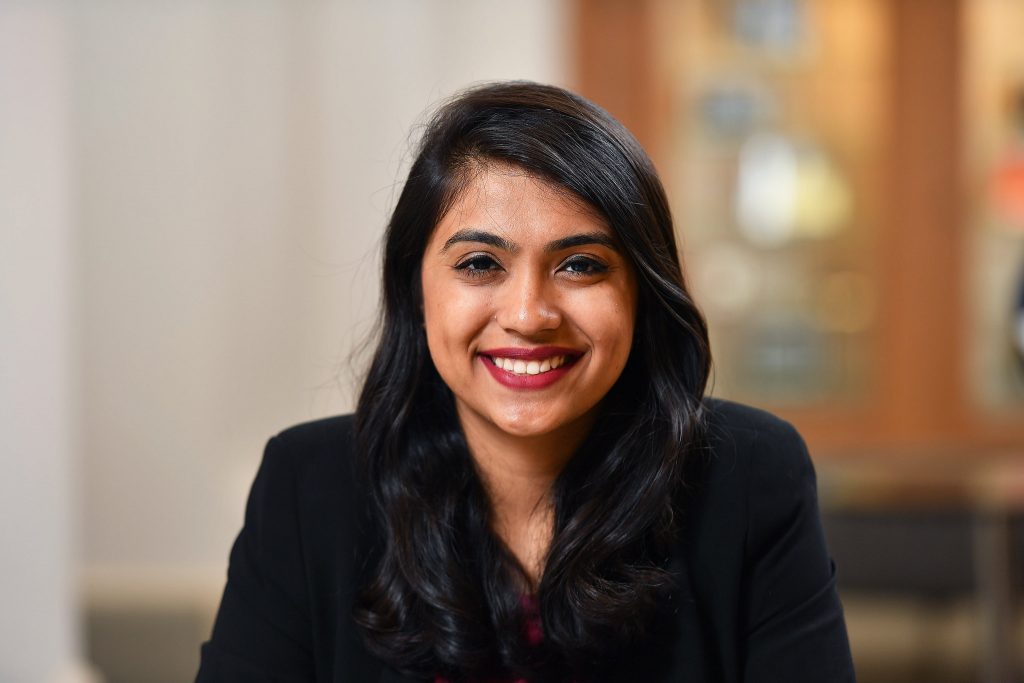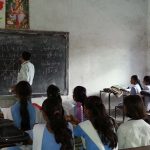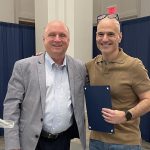Master of global affairs alumna Abeera Akhtar ’20 tells a humorous story about her journey to Notre Dame, where she developed the skills that led to her current work at UNICEF.
“My acceptance from the Keough School ended up in my spam folder and for five days I didn’t know I had received it,” Akhtar said. The welcome news helped shape a career that began in Pakistan, Akhtar’s home country, where she first became concerned about limited opportunities for women.
“I always knew I wanted to go into development work, but I don’t think I really knew what that meant at first,” Akhtar said. “But visiting communities as an undergraduate anthropology student helped provide some clarity. Seeing stereotypes at play and classroom theories in real life further propelled me in this direction.”
Akhtar now works at UNICEF as a gender-based violence product manager, a niche that allows her to combine her digital technology expertise with a commitment to improving women’s lives. She leads the development of Virtual Safe Spaces (VSS) and the Referral Pathways Program (eRPW) for four countries: Iraq and Ecuador for the VSS apps, and Zimbabwe and Bangladesh for eRPW. The platforms are meant to ensure that the most vulnerable girls and women have access to high-quality information and services.
At Notre Dame
Akhtar said her work is influenced by two of her Notre Dame experiences in particular: a one-credit course in information and communication technologies for development taught by Tom Marentette, an IT solutions architect for ND Studios, and her in-country Integration Lab (i-Lab) experience coordinated by i-Lab co-directors Steve Reifenberg and Tracy Kijewski-Correa. For her i-Lab global partner experience, Akhtar developed gender-based violence programs for Oxfam, working across Cambodia and Timor-Leste.
“The i-Lab process leading up to the field experience allowed us to take a deep dive into the human-centered design process and then jump into our projects immediately when we arrived in our respective countries,” Akhtar said.
There are a lot of exciting developments that address the gender digital divide.
After graduation, Akhtar landed what she described as an “incredibly rewarding” fellowship with the Washington, DC-based Digital Impact Alliance with the United Nations Foundation, a group that helps developing countries harness the power of transformative digital technologies.
Professional life in Pakistan
Before beginning the Master of Global Affairs program in 2018, Akhtar co-founded FATE: From Apathy to Empathy, an initiative she launched while she was a student at Pakistan’s Lahore University of Management Sciences. The program won an award from the United States Department of State for its work challenging extremism. She also worked for the Nobel Peace Prize-nominated Global Zero, a movement for nuclear disarmament in Pakistan.
“Growing up in Pakistan, I was no stranger to how extremism can wreak havoc upon a country,” Akhtar said. “Desensitization to the violence is just one aspect of it. To be able to work towards building empathy among Pakistani youth and to share our work on a global platform was overwhelming and exciting, and a true learning experience.”
Working with FATE helped Akhtar understand the importance of metrics and the challenges of measuring qualities like empathy or religious discrimination among school-aged children. It’s in addressing these challenges, she said, that the importance of technology in development first became clear.
The Keough School’s MGA program, with more than 50 countries represented among its students and alumni, advanced Akhtar’s understanding of technology’s role in development, but also did so within the context of a diverse community, a valuable experience widely recognized by graduates and employers.
“My current role has allowed me to ensure that we develop products both with and for the users, and I want to ensure that remains the case particularly when developing for women,” Akhtar said. “There are a lot of exciting developments that address the gender digital divide, and it’s a privilege to be a part of it.”



